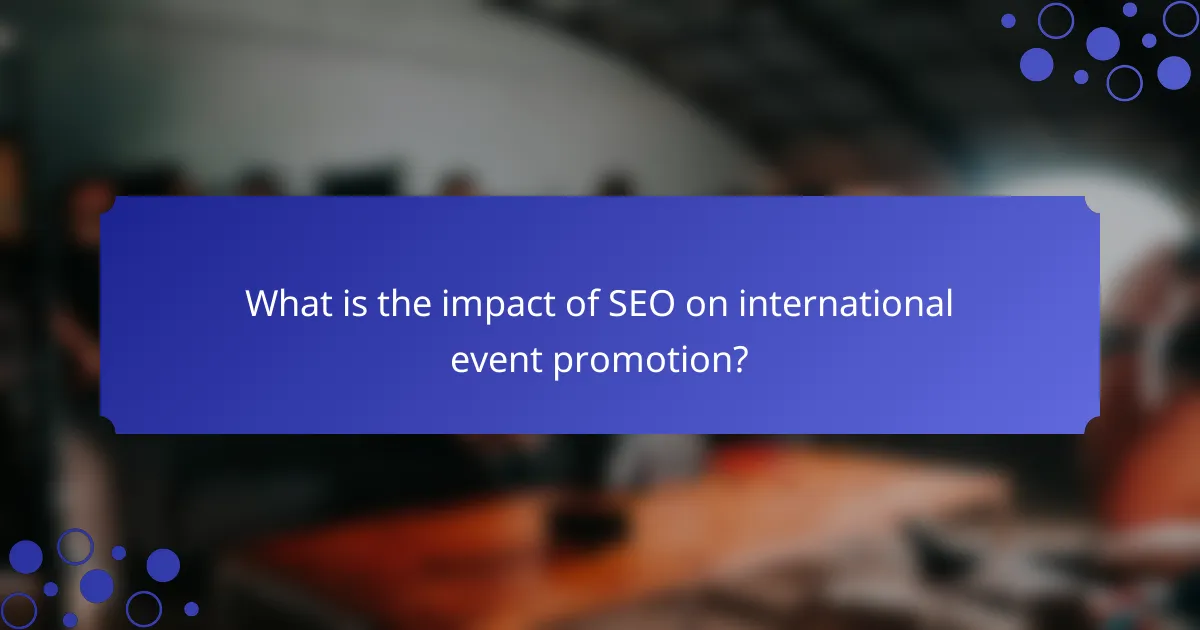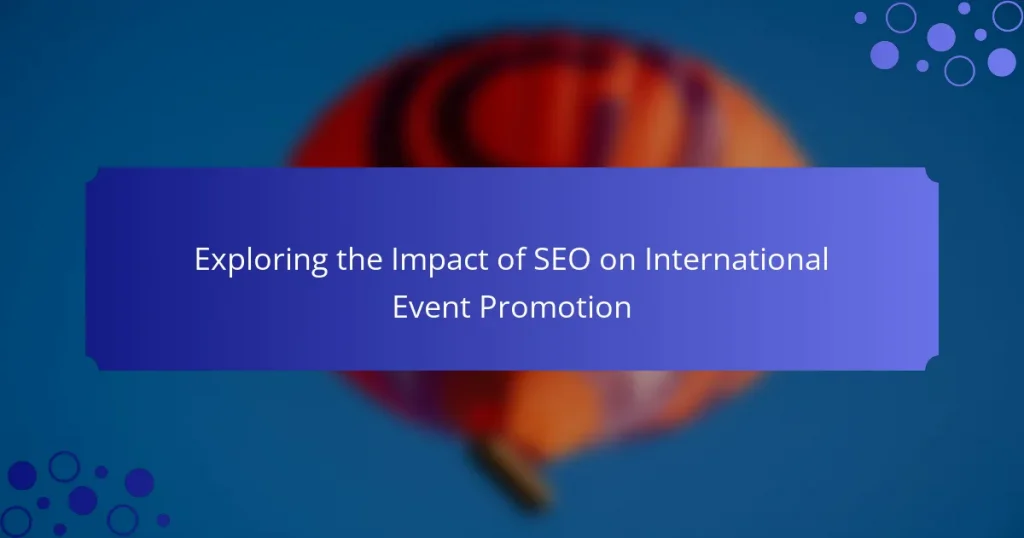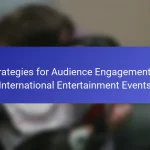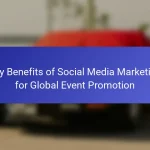SEO, or search engine optimization, plays a crucial role in enhancing the visibility of international events online. By optimizing content for search engines, event promoters can effectively reach a global audience, leading to increased website traffic and ultimately more ticket sales and registrations. Key SEO strategies such as keyword optimization, link building, and content creation are essential for targeting specific demographics and regions. A study by HubSpot indicates that 61% of marketers prioritize SEO for lead generation, highlighting its significance in driving engagement for international events. This article explores the impact of SEO on promoting international events and the strategies that can be employed for optimal results.

What is the impact of SEO on international event promotion?
SEO significantly enhances the visibility of international events online. By optimizing content for search engines, event promoters can reach a global audience more effectively. Improved search rankings lead to increased website traffic. Higher traffic can result in more ticket sales and registrations. SEO strategies include keyword optimization, link building, and content creation. These strategies help in targeting specific demographics and regions. According to a study by HubSpot, 61% of marketers prioritize SEO for lead generation. This statistic underscores the importance of SEO in driving engagement for international events.
How does SEO influence visibility for international events?
SEO enhances visibility for international events by improving their ranking in search engine results. Higher rankings lead to increased organic traffic to event websites. This traffic includes potential attendees, sponsors, and media. Effective SEO strategies include keyword optimization, content creation, and link building. For example, using relevant keywords in multiple languages can attract a global audience. Additionally, local SEO tactics can target specific regions effectively. According to a study by HubSpot, 61% of marketers say improving SEO and growing their organic presence is their top inbound marketing priority. This statistic highlights the importance of SEO in promoting events internationally.
What are the key SEO strategies for promoting international events?
Key SEO strategies for promoting international events include optimizing for multilingual keywords, creating localized content, and building high-quality backlinks. Multilingual keywords ensure that the event reaches diverse audiences. Localized content addresses specific cultural contexts, enhancing relevance. High-quality backlinks from reputable sites improve search engine rankings. Additionally, utilizing social media platforms increases visibility and engagement. Mobile optimization is crucial, as many users access information via smartphones. Monitoring analytics helps refine strategies based on user behavior. These strategies collectively enhance the online presence and accessibility of international events.
How does keyword research play a role in event promotion?
Keyword research is essential for effective event promotion. It helps identify the terms potential attendees use when searching for events. By targeting these keywords, event promoters can optimize their content for search engines. This increases visibility and attracts more attendees. Research shows that 70% of marketers believe keyword research is crucial for SEO success. Additionally, using the right keywords can lead to higher engagement rates. Effective keyword strategies can also improve ad targeting in paid promotions. Overall, keyword research aligns promotional efforts with audience interests, enhancing event reach and participation.
Why is SEO essential for reaching a global audience?
SEO is essential for reaching a global audience because it enhances online visibility across various regions. By optimizing content for search engines, businesses can attract users from different countries. Effective SEO strategies include keyword localization and multilingual content. These practices help connect with diverse audiences. Research shows that 93% of online experiences begin with a search engine. Additionally, 75% of users never scroll past the first page of search results. This highlights the importance of ranking high in search results for global reach. SEO also improves website usability, which can increase engagement from international visitors. Overall, SEO is crucial for effectively promoting events to a worldwide audience.
What are the challenges of promoting events internationally without SEO?
Promoting events internationally without SEO presents significant challenges. First, visibility is severely limited. Without search engine optimization, potential attendees may not easily find event information online. Second, targeting specific audiences becomes difficult. SEO helps identify and reach niche markets effectively. Third, competition is heightened. Many events utilize SEO, making it harder to stand out without it. Fourth, tracking and analytics are compromised. SEO tools provide valuable insights into audience behavior and preferences. Lastly, brand credibility suffers. A lack of online presence can lead to perceptions of unprofessionalism. These challenges highlight the critical role of SEO in successful international event promotion.
How can SEO help in targeting specific demographics for events?
SEO helps in targeting specific demographics for events by optimizing content for relevant keywords. This ensures that the event appears in search results for users interested in specific topics. By analyzing demographic data, marketers can tailor content to meet the interests of target audiences. For example, using location-specific keywords can attract local attendees. Additionally, creating content that resonates with the interests of specific age groups can enhance engagement. Tools like Google Analytics provide insights into audience behavior, aiding in content adjustments. Research shows that 70% of marketers see improved engagement through targeted SEO strategies. This data underscores the effectiveness of SEO in reaching desired demographics.
What metrics can be used to measure the success of SEO in event promotion?
Key metrics to measure the success of SEO in event promotion include organic traffic, keyword rankings, and conversion rates. Organic traffic indicates the number of visitors coming from search engines. This metric shows the effectiveness of SEO strategies in attracting relevant audiences. Keyword rankings reflect the position of targeted keywords in search engine results. Higher rankings correlate with increased visibility and potential attendance. Conversion rates measure the percentage of visitors completing desired actions, such as ticket purchases or sign-ups. This metric directly connects SEO efforts to tangible outcomes. Additionally, bounce rate and average session duration provide insights into user engagement. A lower bounce rate indicates that visitors find the content relevant. Higher session duration suggests sustained interest in the event. Tracking these metrics can provide a comprehensive view of SEO effectiveness in promoting events.
Which SEO tools are most effective for tracking international event performance?
Google Analytics is one of the most effective SEO tools for tracking international event performance. It provides comprehensive data on user behavior and traffic sources. Users can set up specific goals to measure event registrations or ticket purchases. Google Search Console also helps track search performance for event-related queries across different countries. SEMrush offers insights into keyword rankings and competitor analysis. Ahrefs provides backlink analysis and traffic estimation for event promotion. These tools collectively enhance visibility and performance tracking for international events.
How do conversion rates relate to SEO efforts in event promotion?
Conversion rates are directly influenced by SEO efforts in event promotion. Effective SEO strategies increase visibility and attract targeted traffic. Higher visibility leads to more potential attendees finding the event. When relevant keywords are optimized, the right audience is more likely to engage. This engagement often translates to higher conversion rates. For instance, a study by HubSpot found that organizations with a strong SEO presence enjoy conversion rates that are 14.6% higher than those without. Therefore, improved SEO not only drives traffic but also enhances the likelihood of ticket purchases or registrations.
How can SEO strategies be adapted for different regions?
SEO strategies can be adapted for different regions by localizing content and keywords. This involves researching regional search behaviors and preferences. Different regions may use distinct phrases or terms. Adapting meta tags and descriptions to reflect local language is crucial. Additionally, utilizing local backlinks enhances authority in specific markets. Understanding cultural nuances can improve engagement and relevance. For example, a study by Ahrefs shows that localized content can increase click-through rates by up to 30%. Tailoring SEO efforts to regional specifics ensures better visibility and user experience.
What are the best practices for optimizing content for international events?
Best practices for optimizing content for international events include using localized keywords. This approach improves search visibility in different regions. Translating content accurately is essential for reaching diverse audiences. Cultural relevance in messaging enhances engagement and connection. Implementing hreflang tags helps search engines understand language and regional targeting. Mobile optimization is crucial, as many users access content via mobile devices. Utilizing social media platforms popular in target regions expands reach. Finally, analyzing performance metrics allows for continuous improvement and adaptation.
How does local SEO differ from global SEO in event promotion?
Local SEO focuses on optimizing event promotion for specific geographic areas. It targets local audiences using location-based keywords and Google My Business listings. This approach enhances visibility in local search results. In contrast, global SEO aims to reach a broader audience across multiple regions. It utilizes more general keywords without specific geographic targeting. Local SEO strategies often include local backlinks and citations, while global SEO emphasizes international backlinks and global keyword strategies. According to a study by Moz, 46% of all Google searches are local, highlighting the importance of local SEO for event promotion.
What role do backlinks play in enhancing international event visibility?
Backlinks significantly enhance international event visibility by improving search engine rankings. High-quality backlinks signal to search engines that a site is credible and relevant. This increased authority leads to better placement in search results. Consequently, more users discover the event through organic searches. For example, events with numerous backlinks often experience a rise in website traffic. According to a study by Moz, backlinks account for over 50% of ranking factors in Google’s algorithm. Therefore, effective backlink strategies are essential for promoting international events.
What are common pitfalls to avoid when using SEO for international events?
Common pitfalls to avoid when using SEO for international events include neglecting local keyword research. Failing to adapt keywords for different languages and cultures can limit visibility. Another pitfall is not using hreflang tags correctly. Hreflang tags help search engines understand the regional targeting of content. Ignoring local backlinks is also detrimental. Local backlinks improve authority in specific markets. Additionally, not considering local search engines can reduce reach. Some countries prefer specific search engines over Google. Lastly, overlooking mobile optimization can hinder user experience. Many users access information via mobile devices, especially in international markets.
What practical tips can enhance SEO effectiveness for international event promotion?
To enhance SEO effectiveness for international event promotion, focus on localized content. Create event pages in multiple languages to reach diverse audiences. Utilize location-based keywords to improve search visibility in specific regions. Optimize meta tags and descriptions for each language version. Implement structured data markup to help search engines understand event details. Build backlinks from local websites to increase domain authority. Leverage social media platforms popular in target countries to drive traffic. Monitor analytics to assess performance and adjust strategies accordingly. These tips can significantly improve search rankings and engagement for international events.
The main entity of this article is SEO (Search Engine Optimization) and its impact on international event promotion. The article outlines how effective SEO strategies enhance online visibility, attract global audiences, and drive engagement for international events. Key topics include the importance of keyword research, localized content, and backlink strategies, as well as the challenges faced when promoting events without SEO. Additionally, it highlights metrics for measuring SEO success and offers practical tips for optimizing event promotion across different regions.


